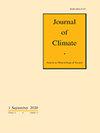Characteristics and Mechanisms of the Interannual Variability of the Northwest–Southeast Shift of the Tropical Easterly Jet’s Core in July
IF 4
2区 地球科学
Q1 METEOROLOGY & ATMOSPHERIC SCIENCES
引用次数: 0
Abstract
Abstract Previous studies have pointed out that the tropical easterly jet (TEJ) core varies longitudinally or latitudinally. Whether there is a linkage between longitudinal and latitudinal variations of the TEJ core remains unclear. We found that, on the interannual time scale, the northward (southward) movement of the TEJ core is typically accompanied by a westward (eastward) shift, characterized by a noticeable northwest–southeast (NW–SE) displacement. This NW–SE shift is most evident in July. A locational index is defined to capture this shift by the difference of area-averaged 200-hPa zonal winds between the western Arabian Sea (AS) and the southern tip of the Indian Peninsula. Observations and numerical simulations demonstrated that the northwestward-shifted (southeastward-shifted) TEJ core is caused by the joint and individual influences from the enhanced (suppressed) convective activities over the eastern AS and suppressed (enhanced) convective activities over the northern Bay of Bengal–South China Sea (BOB–SCS). Enhanced (suppressed) convective activities over the eastern AS can induce upper-tropospheric divergence (convergence) and anticyclonic (cyclonic) circulations to the northwest of the convection, leading to anomalous easterly (westerly) over the western AS. The suppressed (enhanced) convective activities over the northern BOB–SCS can further facilitate the northwestward (southeastward) shift through inducing anomalous cyclonic (anticyclonic) circulation centering at the BOB and the associated anomalous westerly (easterly) over the southern tip of the Indian Peninsula. The NW–SE shift of the TEJ core may have an implication for the change in the area of the intense rainfall in South Asia. Significance Statement The purpose of this study is to explore the linkage between the zonal and meridional variations of the core of the tropical easterly jet (TEJ) and its underlying mechanisms. We found that the TEJ core features a pronounced northwest–southeast shift and this phenomenon only occurs in July. Thus, we defined a locational index to depict this unique characteristic and reveal its relationship with the anomalous convective activities over the eastern Arabian Sea and the northern Bay of Bengal–South China Sea. These results may help improve our understanding of the characteristics and mechanisms of the variations of the TEJ core.七月热带东风气流核心西北-东南移动年际变化的特征和机制
摘要 以前的研究指出,热带东风喷流(TEJ)核心在经度或纬度上都有变化。TEJ核心的经度和纬度变化之间是否存在联系仍不清楚。我们发现,在年际时间尺度上,TEJ 核心向北(向南)移动通常伴随着向西(向东)移动,其特征是明显的西北-东南(NW-SE)位移。这种西北-东南位移在 7 月份最为明显。通过阿拉伯海西部(AS)和印度半岛南端之间的 200 hPa 区域平均地带风的差异,定义了一个定位指数来捕捉这种移动。观测和数值模拟表明,TEJ 核心向西北偏移(向东南偏移)是由阿拉伯海东部对流活动增强(抑制)和孟加拉湾-南海北部对流活动抑制(增强)共同和单独影响造成的。AS 东部上空增强(抑制)的对流活动会诱发对流层上层辐合(辐合)和对流西北部的反气旋(气旋)环流,导致 AS 西部上空出现异常偏东(偏西)气流。BOB-SCS北部上空被抑制(增强)的对流活动可通过诱发以BOB为中心的异常气旋(反气旋)环流和印度半岛南端上空的相关异常西风(东风),进一步促进西北(东南)偏移。TEJ 核心的西北-东南移动可能会对南亚强降雨区域的变化产生影响。意义说明 本研究的目的是探讨热带偏东气流(TEJ)核心的地带性和经向变化之间的联系及其内在机制。我们发现,TEJ核心具有明显的西北-东南偏移特征,而且这种现象只出现在7月份。因此,我们定义了一个位置指数来描述这一独特特征,并揭示了它与阿拉伯海东部和孟加拉湾-南海北部异常对流活动的关系。这些结果可能有助于提高我们对 TEJ 核心变化特征和机制的认识。
本文章由计算机程序翻译,如有差异,请以英文原文为准。
求助全文
约1分钟内获得全文
求助全文
来源期刊

Journal of Climate
地学-气象与大气科学
CiteScore
9.30
自引率
14.30%
发文量
490
审稿时长
7.5 months
期刊介绍:
The Journal of Climate (JCLI) (ISSN: 0894-8755; eISSN: 1520-0442) publishes research that advances basic understanding of the dynamics and physics of the climate system on large spatial scales, including variability of the atmosphere, oceans, land surface, and cryosphere; past, present, and projected future changes in the climate system; and climate simulation and prediction.
 求助内容:
求助内容: 应助结果提醒方式:
应助结果提醒方式:


